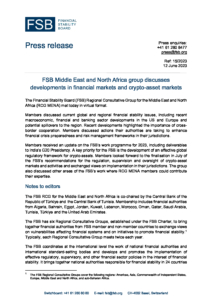Press enquiries:
+41 61 280 8477
[email protected]
Ref: 36/2023
The Financial Stability Board (FSB) Regional Consultative Group for the Middle East and North Africa (RCG MENA) met today in virtual format.
The group discussed global and regional macroeconomic and financial stability developments. Spillovers from bank failures in the US and Europe in March have been muted. However, geopolitical factors are weighing on the outlook and macro-financial risks stemming from a higher-for-longer interest rate environment are rising. The group discussed the implications of a higher interest-rate environment and vulnerabilities in non-bank financial intermediation (NBFI).
The group had an in-depth discussion on arrangements for cross-border payments. The FSB is coordinating the G20 Roadmap for enhancing such payments. In October, the FSB published its first annual progress report on meeting the quantitative targets by 2027, which included an initial dataset of key performance indicators for monitoring progress. Many members viewed the data in the report to be consistent with their own observations, and they discussed regional initiatives to strengthen payments arrangements.
Members received an update on the FSB’s work programme for 2024. The FSB will continue to work on the lessons from the March turmoil and to monitor macro-financial vulnerabilities in a higher interest rate environment. Members discussed ways they could contribute to the FSB’s work programme to bring in additional perspectives from the region, with a particular focus on (i) advancing work on the global regulatory and supervisory framework for crypto-asset markets and activities; (ii) enhancing cross-border payments; (iii) post-March turmoil work; and (iv) strengthening cyber and operational resilience.
Notes to editors
The G20 has made enhancing cross-border payments a priority to achieve faster, cheaper, more transparent and more inclusive cross-border payments, while maintaining their safety and security. The FSB, in coordination with the CPMI and other relevant international organisations and standard-setting bodies, developed in 2020 a Roadmap to address these challenges. The FSB published in October 2023 its latest progress report on priority actions to meet the Roadmap targets.
The FSB RCG for the Middle East and North Africa is co-chaired by the Saudi Central Bank and the Central Bank of Egypt. Membership includes financial authorities from Algeria, Bahrain, Egypt, Jordan, Kuwait, Lebanon, Morocco, Oman, Qatar, Saudi Arabia, Tunisia, Türkiye and the United Arab Emirates.
The FSB has six Regional Consultative Groups, established under the FSB Charter, to bring together financial authorities from FSB member and non-member countries to exchange views on vulnerabilities affecting financial systems and on initiatives to promote financial stability.1 Typically, each Regional Consultative Group meets twice each year.
The FSB coordinates at the international level the work of national financial authorities and international standard-setting bodies and develops and promotes the implementation of effective regulatory, supervisory, and other financial sector policies in the interest of financial stability. It brings together national authorities responsible for financial stability in 24 countries and jurisdictions, international financial institutions, sector-specific international groupings of regulators and supervisors, and committees of central bank experts. The FSB also conducts outreach with approximately 70 other jurisdictions through its six Regional Consultative Groups.
The FSB is chaired by Klaas Knot, President of De Nederlandsche Bank. The FSB Secretariat is located in Basel, Switzerland and hosted by the Bank for International Settlements.
- The FSB Regional Consultative Groups cover the following regions: Americas, Asia, Commonwealth of Independent States, Europe, Middle East and North Africa, and sub-Saharan Africa. [←]
